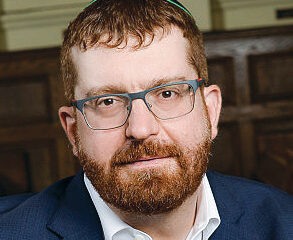Beth Abraham and Beth Jacob explore possibility of merger
By Marshall Weiss, The Dayton Jewish Observer
September 2009
Aug. 23 marked the first meeting of an exploration committee comprising eight members each from Beth Abraham Synagogue and Beth Jacob Synagogue to consider issues that would be involved if the two were to merge.
| Beth Abraham Pres. David Fuchsman |
According to Beth Abraham President David Fuchsman and Beth Jacob President Erv Pavlofsky, the joint committee’s role is to explore all aspects such a merger would entail and to report their findings back to their respective synagogue boards.
The merger exploration talks between the Conservative Beth Abraham and the Traditional Beth Jacob were six months in the making.
“It really started as an informal meeting among friends,” Fuchsman said. “We had one meeting to talk about it in most general terms.”
Following a second meeting in early spring, Pavlofsky said, he and Fuchsman decided to go back to their respective boards to see if they could get approval to form the joint committee.
In June, both synagogue boards approved the exploration of a merger.
The synagogue presidents both cite shrinking membership bases as a prime reason for the talks.
“Both synagogues — look at where they were 20 years ago, just 10 years ago,” Fuchsman said. “Look at where our membership rolls were, compared to where they are now. And when your membership goes down, money aside, you are losing options to do things.”
| Beth Jacob Pres. Erv Pavlofsky |
“The demographic changes in the Dayton Jewish community have put pressure on our finances and membership,” Pavlofsky wrote in a July 14 letter to his congregation, announcing the exploration committee. “Our membership has declined and we have experienced budget deficits for the last several years.”
Fuchsman adds that the synagogues’ financial situations alone were not enough to spark the conversation.
“You obviously can’t deny that it is a consideration, but not the driving force, to the point that we felt if that were the reason for this, then it has no chance to go,” he said. “It really was much more focused on people and what both synagogues could derive from having more people.”
“We are an elderly Jewish community,” Pavlofsky added. “We are a shrinking Jewish community, and we need to look at where we will be five years from now, 10 years from now.”
Currently, Beth Abraham has 220 membership units in the Dayton area; Beth Jacob’s local membership roster also holds 220 units.
Co-chairs of the merger exploration committee are Beth Abraham’s Michael Leffak and Beth Jacob’s Debbie Feldman.
Fuchsman said he and Pavlofsky will be involved with the talks, but from the sidelines.
“This committee has no authority other than to present what they find back to the boards of directors,” Pavlofsky added. “And then the boards of directors will make recommendations as to how to move forward with their own congregations.”
A goal of the exploration committee, Pavlofsky said, is to be as transparent as possible to the congregants.
“The two chairs are going to create a Web site for Beth Jacob and Beth Abraham members to have monthly updates about the process,” he said. “All communications will be joint from Michael and Debbie.”
The committee will explore numerous topics including rituals, education, governance, demographics, and finances.
Pavlofsky said Beth Jacob will also establish a second committee of its own to explore the synagogue’s options should it choose not to merge with Beth Abraham. He said he expects to have a chair in place for this committee by the High Holy Days.
Beth Jacob Synagogue, originally Orthodox, dates to 1875. Through the mid-20th century, Beth Jacob’s members were mainly of Russian-Jewish descent. Beth Abraham Synagogue, also originally Orthodox, was established in 1894 when a small group separated from Beth Jacob. Beth Abraham’s membership through the mid-20th century became associated with Jews from Lithuania.
In the 1940s, Beth Abraham and Beth Jacob leaders almost worked out a merger plan, but it fell through at the time Beth Abraham began to adopt Conservative practices.
Beth Jacob is not affiliated with a particular Jewish movement, but identifies itself as Traditional in practice, a non-egalitarian movement to the religious left of Orthodoxy but to the right of egalitarian Conservative Judaism. Beth Abraham is a member of the United Synagogue of Conservative Judaism.
Last year, Beth Abraham moved from its home of 49 years on Salem Avenue to Oakwood. Beth Jacob has been at its current campus in Harrison Township since 1979.
“We also recognize that there is a risk,” Fuchsman said. “When you have two organizations that have differences in philosophy and approach, there is the possibility the process could end with no merger. But how can you not look at the idea of partnering, especially when you consider the benefits you can get with that?”





